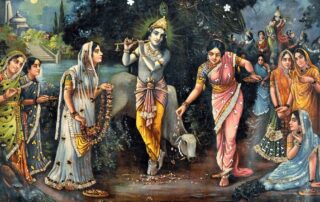Latest Posts
Here you will find all the latest posts on the Bhaktivinoda Institute in the form of Articles, Book Chapters, Songs & Poems etc.
The Sunrise of Eternal Dharma (Nitya Dharma Sūryodaya)
This important article "Nitya Dharma Sūryodaya (The Sunrise of Eternal Dharma)" which was first published in 1885 in Volume 4, Issue 3 of Sajjana Toṣaṇī, predicts the spread of Śrī Caitanya Mahāprabhu’s nāma-saṅkīrtana movement all over the world.
Śrī Kṛṣṇa-saṁhitā – Conclusion
The conclusion to Śrī Kṛṣṇa-saṁhitā by Bhaktivinoda Ṭhākura discusses the principles of sambandha, abhidheya and prayojana and he states that all of his unique conclusions were revealed to him while in a deep spiritual trance (samādhi)
Śrī Kṛṣṇa-saṁhitā – Chapter 10 – Characteristics of Lord Kṛṣṇa’s Associates
Śrī Kṛṣṇa-saṁhitā by Bhaktivinoda Ṭhākura is a revolutionary treatise on Kṛṣṇa, His pastimes and His devotees. In the saṁhitā section of the text, he deals with the spiritual world, the potencies of Kṛṣṇa, His avatāras, His pastimes, and how the demons that Kṛṣṇa killed represent specific obstacles in the life of a devotee.
Śrī Kṛṣṇa-saṁhitā – Chapter 9 – Achievement of the Lotus Feet of Lord Kṛṣṇa
Śrī Kṛṣṇa-saṁhitā by Bhaktivinoda Ṭhākura is a revolutionary treatise on Kṛṣṇa, His pastimes and His devotees. In the saṁhitā section of the text, he deals with the spiritual world, the potencies of Kṛṣṇa, His avatāras, His pastimes, and how the demons that Kṛṣṇa killed represent specific obstacles in the life of a devotee.
Śrī Kṛṣṇa-saṁhitā – Chapter 8 – Direct and Indirect Considerations on the Moods of Vraja
Śrī Kṛṣṇa-saṁhitā by Bhaktivinoda Ṭhākura is a revolutionary treatise on Kṛṣṇa, His pastimes and His devotees. In the saṁhitā section of the text, he deals with the spiritual world, the potencies of Kṛṣṇa, His avatāras, His pastimes, and how the demons that Kṛṣṇa killed represent specific obstacles in the life of a devotee.
Śrī Kṛṣṇa-saṁhitā – Chapter 7 – Considerations on Kṛṣṇa’s Pastimes
Śrī Kṛṣṇa-saṁhitā by Bhaktivinoda Ṭhākura is a revolutionary treatise on Kṛṣṇa, His pastimes and His devotees. In the saṁhitā section of the text, he deals with the spiritual world, the potencies of Kṛṣṇa, His avatāras, His pastimes, and how the demons that Kṛṣṇa killed represent specific obstacles in the life of a devotee.
Śrī Kṛṣṇa-saṁhitā – Chapter 6 – The Pastimes of Lord Kṛṣṇa
Śrī Kṛṣṇa-saṁhitā by Bhaktivinoda Ṭhākura is a revolutionary treatise on Kṛṣṇa, His pastimes and His devotees. In the saṁhitā section of the text, he deals with the spiritual world, the potencies of Kṛṣṇa, His avatāras, His pastimes, and how the demons that Kṛṣṇa killed represent specific obstacles in the life of a devotee.
Śrī Kṛṣṇa-saṁhitā – Chapter 5 – The Pastimes of Lord Kṛṣṇa
Śrī Kṛṣṇa-saṁhitā by Bhaktivinoda Ṭhākura is a revolutionary treatise on Kṛṣṇa, His pastimes and His devotees. In the saṁhitā section of the text, he deals with the spiritual world, the potencies of Kṛṣṇa, His avatāras, His pastimes, and how the demons that Kṛṣṇa killed represent specific obstacles in the life of a devotee.
Śrī Kṛṣṇa-saṁhitā – Chapter 4 – The Pastimes of Lord Kṛṣṇa
Śrī Kṛṣṇa-saṁhitā by Bhaktivinoda Ṭhākura is a revolutionary treatise on Kṛṣṇa, His pastimes and His devotees. In the saṁhitā section of the text, he deals with the spiritual world, the potencies of Kṛṣṇa, His avatāras, His pastimes, and how the demons that Kṛṣṇa killed represent specific obstacles in the life of a devotee.
Śrī Kṛṣṇa-saṁhitā – Chapter 3 – Descriptions of the Lord’s Incarnations
Śrī Kṛṣṇa-saṁhitā by Bhaktivinoda Ṭhākura is a revolutionary treatise on Kṛṣṇa, His pastimes and His devotees. In the saṁhitā section of the text, he deals with the spiritual world, the potencies of Kṛṣṇa, His avatāras, His pastimes, and how the demons that Kṛṣṇa killed represent specific obstacles in the life of a devotee.
Śrī Kṛṣṇa-saṁhitā – Chapter 2 – Descriptions of the Lord’s Energies
Śrī Kṛṣṇa-saṁhitā by Bhaktivinoda Ṭhākura is a revolutionary treatise on Kṛṣṇa, His pastimes and His devotees. In the saṁhitā section of the text, he deals with the spiritual world, the potencies of Kṛṣṇa, His avatāras, His pastimes, and how the demons that Kṛṣṇa killed represent specific obstacles in the life of a devotee.
Śrī Kṛṣṇa-saṁhitā – Chapter 1 – Descriptions of Vaikuṇṭha
Śrī Kṛṣṇa-saṁhitā by Bhaktivinoda Ṭhākura is a revolutionary treatise on Kṛṣṇa, His pastimes and His devotees. In the saṁhitā section of the text, he deals with the spiritual world, the potencies of Kṛṣṇa, His avatāras, His pastimes, and how the demons that Kṛṣṇa killed represent specific obstacles in the life of a devotee.
Śrī Kṛṣṇa-saṁhitā – Introduction Part 3
The Introduction to Śrī Kṛṣṇa-saṁhitā by Bhaktivinoda discusses the philosophy and development of Indian religion from a historical and geographical viewpoint.
Śrī Kṛṣṇa-saṁhitā – Introduction Part 2
The Introduction to Śrī Kṛṣṇa-saṁhitā by Bhaktivinoda discusses the philosophy and development of Indian religion from a historical and geographical viewpoint.
Śrī Kṛṣṇa-saṁhitā – Introduction Part 1
The Introduction to Śrī Kṛṣṇa-saṁhitā by Bhaktivinoda discusses the philosophy and development of Indian religion from a historical and geographical viewpoint.










